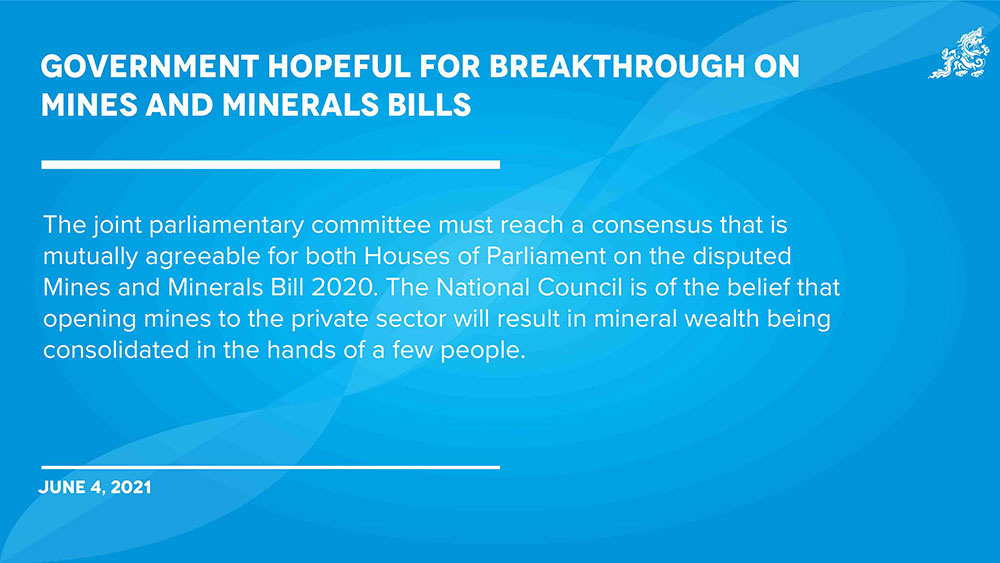The government is hopeful that a common ground will be found to break the deadlock between the two Houses of Parliament on the disputed Mines and Minerals Bill 2020.
The joint parliamentary committee must reach a consensus or try to come up with recommendations that are mutually agreeable to both Houses for deliberation in a joint sitting towards the end of the summer session.
Economic Affairs Minister Loknath Sharma said that he would not have issues accepting recommendations of the joint committee but added that the government did not want total closure of mines to the private sector. “I would be disappointed if the Bill is not passed.”
The National Council wants operation of all mines by state-owned enterprises (SOEs), but the government and the National Assembly are in favour of allocating strategic mines to state-owned enterprises (SOEs) and leaving non-strategic ones open to the private sector.
Lyonpo Loknath Sharma said that he agreed that mineral resources had benefited only a handful of people. “However, extraction capacities could be hampered due to possibilities of corruption and management complacencies if all mines are operated by the state.”
He said that the Bill has provisions not only for auctioning mines where 48 percent of the shares should be allotted to the public but also for allocation to SOEs depending on the government’s decision.
He said the government’s decision was not influenced by private individuals. “We have no conflict of interest. We want to avoid practical issues in implementation of the Act later.”
Lyonpo Loknath Sharma said that some of the provisions of the Mines and Minerals Management Act 1995 were flawed and need to be replaced with new provisions.
He cited Section 10 of the Act, which states that the head of ministry (minister) shall be the sole authority to lease mineral deposits and he shall delegate all necessary powers to the division head. “Such a provision can lead to corrupt practices such as collusion in the future.”
He said that the Bill rectified the loopholes in the present Act and the Mines and Minerals Management Regulations 2002 that gives the minister the sole authority to allocate non-pre-identified mines to private individuals on a first-come-first-serve basis.
Section 79 of the new Bill states, “All mineral reserve proven by the Department of Geology and Mines shall be allocated through public notification either through sealed or open competitive bidding process or to a state-owned enterprise.”
Earlier, mines were auctioned to private individuals as per the Mines and Minerals Management Regulations 2002, which states that in case the government decides to lease a pre-identified mineral deposit for commercial exploitation, it shall be done through public notification and sealed/open tendering process.
“The mines that were operated by private companies before were pre-identified and auctioned as per the regulations. Had it not been for the regulations, the present Act gives the minister power to allot minerals on a first-come-first serve basis, which would not be good,” Lyonpo Loknath Sharma said.
He said that the Bill ensures that the economic benefits of the mines and minerals are distributed among members of the public through corporate social responsibility (CSR) and floating of shares.
Observers say that under the prevailing system, local communities do not benefit much from the mining and minerals sector.
The National Council is of the view that opening mines to the private sector would lead to the mineral wealth going to the hands of few individuals.
The NC’s views are also based on Article 1(12) of the Constitution, which states, “The rights over mineral resources, rivers, lakes and forests shall vest in the State and are the properties of the State, which shall be regulated by law.”
At a recent press conference, eminent member of the National Council, Phuntsho Rapten, said that the disagreements pertain not to certain disputed clauses, but the whole Mines and Minerals Bill.
The joint committee, the eminent member said, had been trying to find some common understandings but without much success.
Phuntsho Rapten added that the discussion was still ongoing.
By MB Subba
Edited by Tashi Dema


